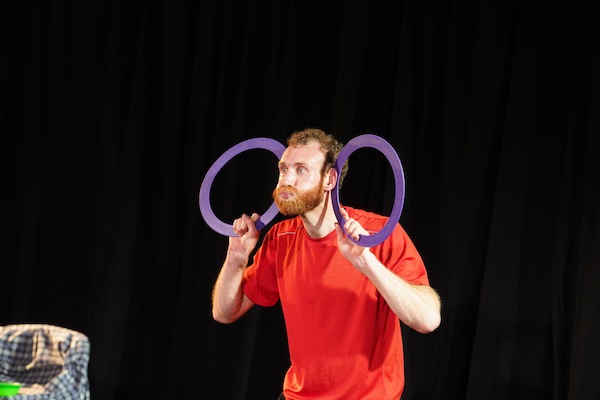Janoah Bailin in SpinS. (photo from Janoah Bailin)
In anticipation of this year’s Vancouver Fringe Festival, which runs Sept. 5-15 at various locations throughout the city, the Jewish Independent interviewed some of the Jewish community members participating in the festival – Janoah Bailin, Erika Babins, Jed Weiss, Zach Wolfman, Melanie Gall, Susan Freedman and Shane Adamczak. They hail from as far away as Australia and their shows are vastly different, but they all have the same goal: to draw you into their world, perhaps allowing you new insights into yours.
* * *
SpinsS, at the Nest: “A wildly dizzying whirl of juggling, giggling, magic and movement, puppetry, PJs, circus and socks, totally tangled together! A unicyclist careens on stage, unpacking a quirky world of clothespin towers, erratic toothbrushes and gargantuan grins. Objects swirl into chaotic creation as Janoah constructs a performing-partner puppet from piles of props!”
Clothespins are “a recurring object in the performance,” Janoah Bailin told the JI. And so are, from the looks of it, some dangerous manoeuvres. But looks are intentionally deceiving, in order to entertain.
“I’ve actually never been seriously injured doing my work!” said Bailin. “Some stubbed toes and scraped elbows, sore wrists from catching myself, but nothing major. The worst is taking a pedal to your shin. When you learn unicycle, you learn falling. It just happens, you develop an innate sense of what you can and can’t comfortably do. I know how to fall and it happens all the time and I get up, shake it off, try again.
“This show plays with limits and bringing the skills to their limits – I expand or contract juggling patterns until I physically can’t hold them anymore and there’s a spin I do on the unicycle that spirals in on itself until I fall. So, falling is inherent in the show and I need to know how to do it well.
“I think I forget that audiences don’t know this,” he said about his being safe during his act. “So they are a lot more scared for me than I am, which is part of the magic of circus: faking instability, making something seem more chaotic than it is. The most dangerous stuff is long-term: keeping your body healthy through the strain of performing every day, the bipolar energy of performance – being totally on for an hour, all your energy focused on that one thing. The solutions to this are getting really good at physical self-care: know how and when to rest and stretch. The hardest work is taking care of my body in the long run.”
Bailin understands the use of the word “escapism” to describe his show, but said his goal is to bring audiences into his world for an hour, and “that seems like incredible presence, not escaping.”
Playful is another common description of SpinS.
“One of the aspects of my show that I’m incredibly proud of is that even fellow performers find the show playful,” said Bailin. “A lot of circus can start to look similar in the tricks and how they’re presented and, in certain ways, I aim to break those forms and I think I’m successful.
“Play is so important, and I mean play in the sense of creating space, pushing boundaries, trying things out. In my opinion, getting locked in routines is quite dangerous and play is a solution to this. Circus can seem quite playful, but it’s incredibly repetitive, the tricks are so hard they take an incredible amount of practice, so, by learning them, we make ourselves routine. I try to counterbalance this by choreographing at the edge of my ability – I can’t comfortably do all the things I do on stage, so they remain alive because I need to concentrate and there’s a very real danger that they won’t work and then I need to find a different solution – and also by choreographing through games, playing games on stage – how can I unpack a suitcase without getting off the unicycle?”
Bailin started juggling when he was 10, so he’s been at this for some 20 years now.
“I’m at the point in juggling and unicycling where I’ve mastered the basics and get to develop my own style,” he said. “So, I’m watching and feeling myself do the skills and how I can integrate my personality into them…. Also, I am continually excited about the challenge of piecing together shows, taking all the bits and fitting them together into something cohesive through all the disciplines I work with: circus, dance, puppetry, storytelling, magic.”
* * *
Lift, at Firehall Arts Centre: “Lift is a contemporary musical set in London’s Covent Garden Tube Station. The elevator ride takes one minute, but the journey inside takes us through eight lifetimes, allowing the characters to see and say things that might not otherwise … come up.”
“As a company, Awkward Stage is always looking to tell stories that haven’t been heard yet and, like many of our productions, Lift will have its Canadian première with us at the Fringe,” choreographer and Awkward Stage Productions artistic associate Erika Babins told the JI.
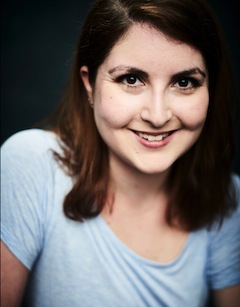
“I think what drew us all into this story was the way that it was told. It intrigued us, the way the play bends reality and imagination. Our setting never changes but changes constantly, the characters are all rich relationships yet are strangers. We are constantly playing with those dichotomies in rehearsal.
“The script leaves a lot of room for interpretation and we’re so lucky to be working with a cast of brave and intelligent actors who are making discoveries with us as we build this show. Plus, the music is beautiful; it’s been stuck in my head for months.”
Choreography is integral to the show. It helps delineate the imagined settings to which the elevator riders take us. “The jostling of a train, warming up at a ballet studio, being at a strip club. It also helps to blend the lines between reality and the imaginings in the Busker’s mind,” said Babins. “The choreography in this show is quite integrated into the storytelling – there aren’t any ‘dance sequences’ per se, the movement weaves itself into the text and music.”
Jed Weiss plays the Busker, who he describes as “the quintessential introspective artist.”
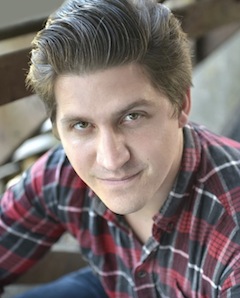
“This leaves him both capable of deep insight as well as myopic self-centredness,” explained Weiss. “His arc is largely around learning and accepting that he has to be more considerate of the needs and lives of the people around him, leading him to a profound personal growth that his self-centred introspection could not achieve. This connects with the theme of the piece as a whole, highlighting the need to be brave in the face of vulnerable social interaction, to make meaningful connections with those that are important to you.”
The character, he added, “shines light on the shortcomings of the artistic male archetype we so often see in rom-coms and other media. Instead of following the stereotypical path of a tortured artist pining after a muse until she falls for him, it shows that real growth comes instead from practising sympathy towards the needs of others, not a commitment to romantic obsession.”
“I am playing Tall Dark and Handsome (TDH), a psychiatrist, and an American tourist,” said Zach Wolfman. “TDH is the dating avatar for Bright Young Thing (BYT) and represents BYT’s online persona. The American tourist is lost and looking for directions in London, hoping to bump into the Queen and visit Buckingham Palace.”
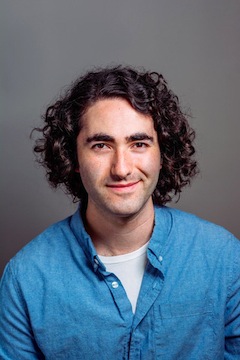
For Wolfman, the character he plays allows him “to explore the dissonance between the face we show online versus how we act in real life. Getting to embody that daily interaction we all engage in online is fun for me.
“The play as a whole is very dynamic,” he said, “and I really enjoy the fast pace and shifts we make between different settings. One minute, we’re in a lift; the next, we’re in a club or a chat room. Lift definitely highlights the different masks we wear at work, online and in our relationships. How vulnerable are we and how willing are we to open ourselves up to those who are close to us, or simply strangers in a lift?”
“I hope the audience leaves the theatre with a little wonder,” said Babins. “I hope they wonder about what happens to the characters after the moments we meet them in, but I also hope they wonder about themselves, and the connections and disconnections they have every day.”
* * *
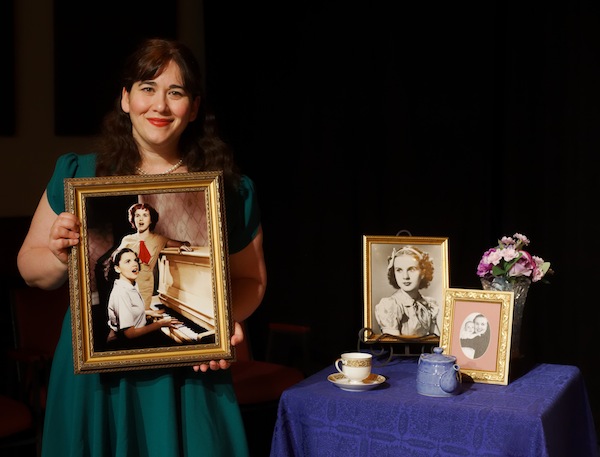
Ingenue: Deanna Durbin, Judy Garland and the Golden Age of Hollywood, at Firehall Arts Centre: “Judy is an icon – loved as Dorothy in The Wizard of Oz. But, in the 1930s, Deanna Durbin was a far bigger star. A favourite of Roosevelt, Churchill, even Mussolini, her first kiss was front-page news. At 27, she disappeared to a life of obscurity in France. The true tale of the lifelong friendship and rivalry of two great stars of Old Hollywood.”
“I’ve always loved Deanna’s music and her movies. We have similar voices and look vaguely the same. Also, Deanna is a Canadian movie star who has almost completely been forgotten,” said Melanie Gall. “Her legacy is one well worth saving, and I hope that my show will help preserve her memory for old fans, and will introduce her and her music to a new generation.”
Always fascinated with history and with historic music, Gall has written and performed shows about Vera Lynn, Edith Piaf, Jacques Brel, George Gershwin, and First and Second World War knitting songs. In creating a new work, she said, “First off, I think about the music. What are the songs I’d like to sing, and which songs will stay interesting and relevant to me after over a year of touring?
“I then look at marketability and if a topic I’m considering will have commercial appeal. I then ensure that it has not been done before, or that it has not been done in a similar way to how I plan to present the topic.
“I also try to find a topic I feel passionate about and that I’d like to share through a theatrical piece.
“Finally, I try to judge if I’m the best person to present the topic. Do I sing in the correct style? Can I do the topic justice?”
For Ingenue, said Gall, “I was performing another show of mine, Opera Mouse, Off-Broadway in New York. After performing each day, I went to the New York Performing Arts Library and dug through historic clippings, notes and scrapbooks. I spent days combing through crumbling articles and building a comprehensive biography of Deanna Durbin. Researching Deanna’s mannerisms and speech involved tracking down and watching all of her movies, most of which are actually very hard to find.
“Researching the music involved listening to and playing through dozens of songs to choose the tunes for the show. Then, with the help of pianist and recording engineer Bennett Paster, I arranged and recorded the backtracks, maintaining historic integrity, while creating original arrangements. Much of the script is taken directly from interviews and articles about her life, and several sentences are accurate historic quotes. So, it’s a lot of work, but it’s work I love doing.”
Preserving history is a passion. “So much wonderful music and stories are in danger of being lost or forgotten, and I have devoted my life to preserving them. Although Deanna Durbin wasn’t Jewish, the producer and director who made her a star, Joe Pasternak and Henry Koster, were Jewish – they arrived in Hollywood after years of working in the Berlin Universal studio, fleeing in 1933 when Hitler came to power. Also, the composers of most of Deanna Durbin’s songs were Jewish. So, there is a strong connection.”
* * *
Old-ish, at the Havana Theatre: “It’s about aging and death only WAY funnier! Susan’s fifth one-woman comedy travels the hilarious, rocky road from denial to grudging acceptance of getting older.”
“I guess I’ve been ‘collecting data’ for this show for a long time,” said Susan Freedman, 77. “For about the last five years, whenever I hear news about my contemporaries, it is mostly not happy! The realization finally dawned that people do get really sick at my age and, yup, they die at my age too. I always write about issues and events that are important in my life and I always hope that my stories will resonate with audiences who may be experiencing similar events and feelings.”
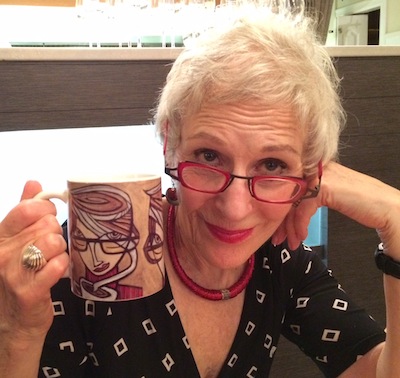
The show is structured around events in Freedman’s life that lead into one another thematically and more or less chronologically.
“I have had so much fun working with my son (Alan Silverman) on this show,” she said. “This is the first time he has directed me, though he is an experienced film director. He is smart, he’s a great writer and he has a terrific sense of humour. Do I sound like I’m his mother?
“I have worked with my husband (Bill Galloway) on all five of my shows. He is stage manager – calling the lights and music – on this show and he has been stage manager or slide projectionist on the others. He’s a huge help and support for me and, as I travel across the country with my shows, I get to have him as a roommate on the road! We have a great time traveling together.”
This Fringe marks Freedman’s 20th year of writing, producing and performing solo Fringe shows. When she did her first show, in 1999, she said, “my mother was still alive and I was sure she would live forever, so I certainly didn’t think of myself as old. I am frankly shocked that I’m the age I am. Like most of my friends, I have no idea how the years could have raced by so fast! There are lots of changes as we age, but there are still so many things we can do and enjoy and so much that makes life worthwhile. I am enjoying the good luck of being healthy, although I’m aware that can change on a dime.”
Admitting that she was nervous “about doing a show on aging and death,” she said, “but we are all aging and, if we’re lucky, we will get old. Critics are saying the show is uplifting. So, even though getting old can certainly present us with plenty of problems, it’s always good to laugh – right?”
* * *
Zack Adams: Love Songs for Future Girl, at Revue Stage: “… love, loss, heartbreak, growing bad ginger beards and everything in between. Think of it as a cross between a rock concert and group therapy.”
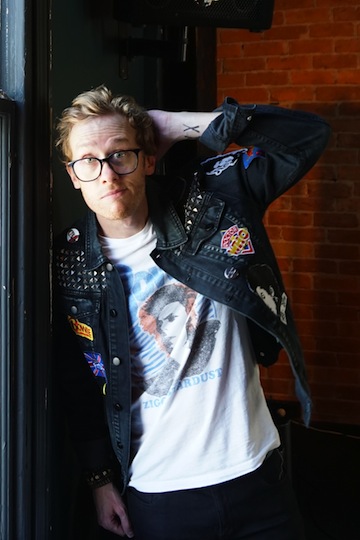
Shane Adamczak actually has two shows in this year’s Fringe. “Zack Adams got through because I won the lottery and The Ballad of Frank Allen is a one-off performance that the Fringe asked us to do as part of their Pick Plus season, where they bring back popular shows from previous years,” he explained.
The Ballad of Frank Allen, which is on one night only, at Performance Works, is “about a janitor named Frank who is accidentally shrunk in a science lab and ends up living in another man’s beard,” said Adamczak. “Yes, that is really what it’s about. It’s an exploration of masculinity in these modern times and what it means to be a ‘good man.’”
Adamczak uses music to tell his stories.
“I find it is such an accessible medium for people,” he said of that choice. “You’re so hard-pressed to find someone who doesn’t love some music at least. It’s also a way for me to live a rock star wannabe fantasy out on stage but using music as a theatrical device to tell stories.”
Both of these shows, he said, “are labours of love and very close to my heart for different reasons. If you love music, good storytelling and to laugh your ass off, please do come along.”
For the full Fringe lineup and tickets, visit vancouverfringe.com.

